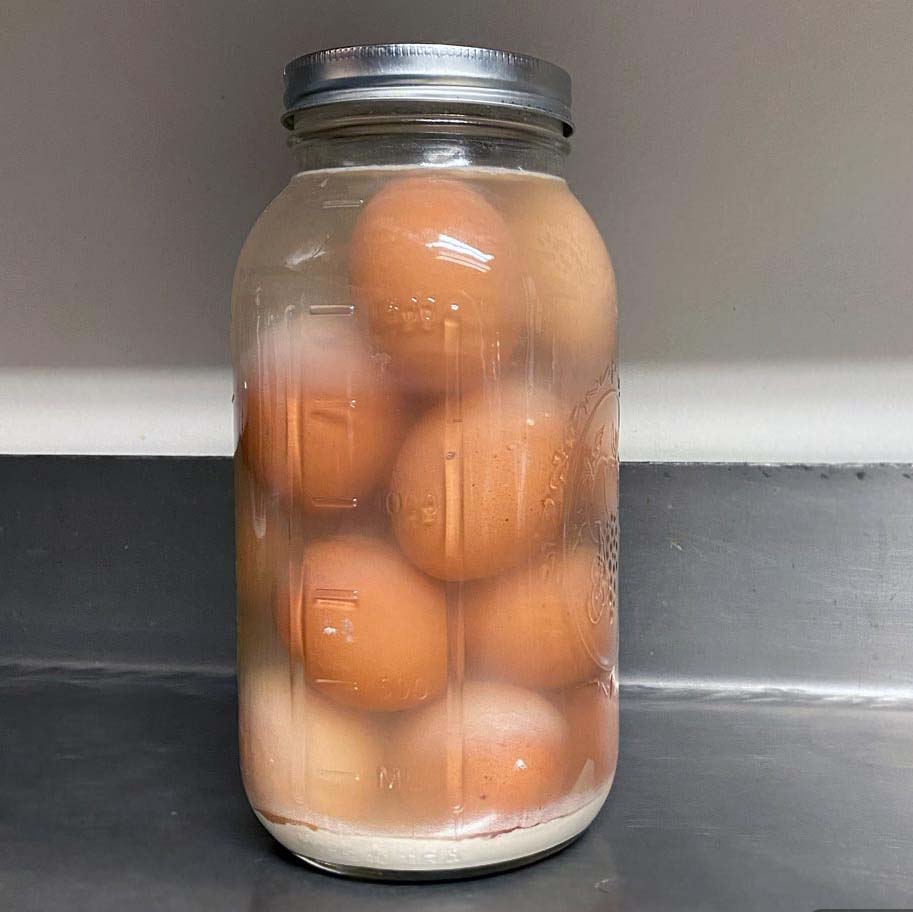 🖨️ Print post
🖨️ Print post
It’s that time of year when eggs are in abundance. We love having chickens and getting fresh eggs daily. But what to do with all those eggs? Well, aside from the obvious (scramble them, make quiche, boil them for a variety of uses) … you can also make ice cream custard, Caesar dressing, or add the raw yolks to smoothies and porridge.
But if you have chickens of your own or picked up a ton at your local farmer’s market, you should definitely preserve some by water glassing. Water glassing allows eggs to be preserved raw so that you can use them as you normally would throughout the winter when eggs production is slower.
Water glassing is a simple and safe way to preserve eggs using pickling lime and water. It’s important that fresh, unwashed eggs are used. This method will allow you to preserve eggs in a raw state for 12-18 months. The idea is that this will carry you through until the next “season” when hens start laying again.
When it comes to eggs, it’s truly feast or famine. Chickens only lay eggs consistently when they have enough light from long days. (Some people add lights to their coop to trick chickens into laying year-round, while others feel this is nature’s way of giving the chicken’s bodies a break from laying.) If you have backyard chickens, take advantage of the abundance during spring and summer and put some eggs away for the colder months when chickens aren’t laying very regularly.
Even though eggs that have been water glassed are preserved fresh, I would suggest to still cook them fully, just to be safe. I eat raw eggs in all sorts of ways (a few of those recipes I mentioned above) but only when the eggs are truly fresh (less than two weeks old) and from a trusted source.
Check out all the details in this the video.
Equipment
- 1 Kitchen scale
- 1 Container with lid
Ingredients
- 16 Fresh, Unwashed Eggs
- 1 Oz Pickling Lime (Calcium Hydroxide)
- 1 Quart Water
Instructions
- Select an appropriate container. For the video demonstration I used a half gallon Mason jar. You can use a crock or even a plastic bucket with a lid.
- Place fresh, UNWASHED eggs in the container. The eggs must be unwashed and clean (no noticeable dirt or grime attached) and devoid of cracks.16 Fresh, Unwashed Eggs
- Using a kitchen scale, measure out 1 ounce of pickling lime. Add it to the 1 quart of water and stir to mix. Pour the solution over the eggs until they are completely submerged.1 Oz Pickling Lime (Calcium Hydroxide),1 Quart Water
- Store the sealed container in a preferably dark space. These last me until the next year and I use them in all of my recipes (pancakes, cornbread, etc.) where truly fresh eggs aren’t necessary.
Troubleshooting Tips
- The solution will separate once it sits, this is totally normal.
- Before using, always rinse the eggs when you take them out of the solution to remove the pickling lime from the shells.
- The yolks might separate and run into the white of the egg. I noticed that the eggs in my dark crock prevented this from happening slightly.
- Crack the eggs separately and smell them before adding to any recipe, just to be safe. There is always a chance that they had a crack in the shell and the solution would have penetrated through.
- If you’re working with a large container (like my crock in the video), you can add eggs and solution as you go. Just make sure the eggs are submerged each time.



Do you have videos?
Yes! Here is the video to accompany this recipe: https://www.youtube.com/watch?v=OEIsvgb9w2s
Hello Brittney,
Honestly I am new to the world of farm fresh eggs.
WOW, thank YOU; I WANT to TRY water glassed eggs!!
You instruct that the eggs must be UNWASHED.
Questions, please:
1. *WHAT* does one do if any eggs bought at a farmer’s market have smudges of dirt or hen droppings on them?? Should those dirty eggs just be set aside and NOT used for water glassing?
2. *HOW* does one safely wash smudged or dirty farm fresh eggs WITHOUT CHEMICALS before using them in recipes?
I *appreciate* your time and helpful guidance.
Sincerely, Debra
Hi Debra!
Thanks for your comment!
1. I wouldn’t use the ones that have smudges/droppings for water glassing. I would just use those fresh and select the cleaner ones for preserving this way.
2. I don’t use soap on my eggs when I wash them, simply warm/hot water and a sponge or cloth. The warm/hot water prevents bacteria from penetrating through the pores because it causes the shell to expand. Cold water causes the shell to contract which could allow bacteria entrance. (Once washed, store them in the fridge or use right away.)
-Brittney
I had one crack and the egg came out. It seems to cook the egg. Is the batch still safe or must I throw it all out?
Can I reuse the water and lime for a second batch of eggs?
Thanks Pat
Do they need to be stored in a cold area or will they be ok in a dark, room temp spot?
Do you know if I can reuse the jar for other foods once they have sat for a while with the cal lime in them?